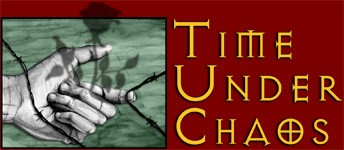
MallihkIndex | Time Under Chaos | Concerning Amber | The Golden Circle | Mallihk Head of State: Holy King Acopoetl (de jure), 29th High Priestess of the Balance Yamintal (de facto) By this my blood, O Powers When others of the Golden Circle think of Mallihk, they think of human sacrifice. This is not inaccurate, though the horror it inspires is largely misguided. The Mallihki regard sacrifice as a high honor, and it is performed according to strict rules. It is almost unheard of for travelers to end up on the altar. Indeed, when the Mallihki priesthood sacrificed several high-ranked Chaosian prisoners of war near the end, they believed they were offering their victims the highest honor they could accord--the Mallikhi greatly respected their enemies' martial prowess. Chaos did not quite see it that way, and Amber's diplomats were somewhat at fault for not clarifying the misunderstanding sooner, busy though they were at the time. It was all smoothed over before more than a few outlying towns were razed, and the Mallikhi promised not to sacrifice any more Chaosians without clearing it by their Houses first. (A similar misunderstanding with respect to Amber had occurred millennia ago, but fortunately for them, the Mallihki did not manage to get their ceremonial obsidian knives into any scions of the Blood, and thus their Shadow still exists.) As uncivilized as human (or Chaosian) sacrifice seems to the outside observer, it is the natural result of the metaphysics of Mallihk. The Blood, quite simply, really is the Life. Without the annual schedule of sacrifices, magic as it exists in the Shadow would stop working, and civilization there would collapse. Mallihki religious cosmology contains a lengthy explanation of why this is so, but the practical outcome is that the stepped pyramids rising from the jungles are stained with blood. Ayatal, 18th High Priestess of the Balance, in her Meditations, proposed that the murder rate of other Shadows serves the same metaphysical purpose, and mused that the Mallihki system is superior. (Ayatal is popular reading among certain jaded non-Mallihki circles.) Sacrificial metaphysics aside, Mallihk is a pleasant Shadow. Her people enjoy life, and Blood magic makes what would otherwise be a somewhat spartan existance quite comfortable--a lack of metal is compensated for by Blood-treated wood or stone, and a complete absence of draft animals is no obstacle in the face of Blood golems animated to haul and carry. Some metal, horses, oxen and the like have diffused into the Shadow from its neighbors, but are largely regarded as curiosities. Mallihk primarily exports luxuries like tropical fruits and hardwoods, and the chocolate to which much of the Golden Circle is addicted. The Mallihki Empire stretches from the sea in the west to the high mountains in the east, tied together by a loose system of tributes which buy permission for citizens of tributary states to use the Imperial roads and be included under the mystical aegis of the Imperial sacrificial calendar. The three main nations are Mallihk, whence the Empire and the Shadow draw their name, which lies in the central rainforest, Ygotl, which controls most of the western seacoast and the northern deserts, and Coepiq, which is in the western mountains. The differences among the nations are largely invisible to outsiders, a fact which meets with much indignant sputtering when pointed out to the Mallihki. The government lies almost entirely in the hands of the priesthood, though there is a secular administrative branch, the titular head of which is an appointed Holy King, who is sacrificed at the end of his 60-year reign. It is always a Holy King--women are exempt from sacrifice, since their menstrual cycles and childbirth are regarded as fulfilling the Blood requirements for their half of the race, though they may volunteer and thus be doubly contributive to the health of the land. Neither the Unicorn nor the Serpent Church has much traction in Mallihk. Their religion espouses the concept of complementary opposites, and the Mallihki accept Chaos's ascendancy over Amber as a rising tide that will inevitably ebb, as Amber's dominance did, and as all things must--the Balance will always be preserved, and it behooves a people to move with the Balance rather than struggle against it. |